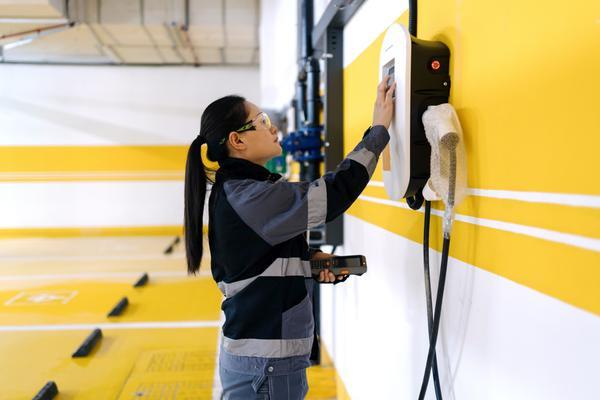Why choose a product with a BSI Kitemark for EV Chargers?
By selecting a product bearing the BSI Kitemark for EV chargers, you can rest assured that it has been rigorously tested according to best quality and safety practices including any legislative requirements, setting it apart from other market options.
The BSI Kitemark for EV chargers is a mark of trust that showcases the quality and reliability of the EV charger. For an organization to receive the BSI Kitemark for EV chargers, it must pass all the tests required by the BSI certification scheme, not just once but continually. We also check the manufacturer sites to assure they are being made consistently, correctly, and to the expected level of quality.
As we increasingly invest in EV infrastructure, a sound, future-ready one that will deliver continual service to your user and perform safely is essential for organizations making a financial commitment to an EV charger. Assuring your users of its quality and reliability is essential for consumers to trust your organization and select your services over others.
The typical standards the charger is tested against include:
Please note that this is not a comprehensive overview of all the standard and testing requirements. It is intended to highlight key features of the standards, testing, and certification process.
The Kitemark certification can be stand alone or be combined to demonstrate an optimized ChargePoint or EV charger for Safe, Smart and Accessible elements. The Safe certification standard is IEC 61851-1, which is the pre-requisite for Electric Vehicle Supply Equipment IEC 62196. The accessible component is tested against PAS 1899. The Smart certification element includes certifying against the UK Smart Charge Regulation or ETSI EN 303 645.
Kitemark for EV Chargers (IEC 61851-1)
Electrical Safety:
- Insulation: Check that the wires and parts that carry electricity are properly insulated so there's no risk of electric shock.
- High Voltage Test: Test the charger's ability to handle high voltage without breaking down.
- Shock Protection: Ensure the charger automatically shuts off if something goes wrong to prevent electric shock.
Charging Modes:
- Different Modes: Make sure the charger works correctly with all types of charging methods (basic to fast charging).
Operational Safety:
- Normal Use: Test the charger to ensure it works correctly under normal conditions.
- Fault Conditions: Simulate problems (like power surges) to make sure the charger responds safely.
Environmental Testing:
- Temperature: Test the charger in both very hot and very cold conditions.
- Humidity: Ensure the charger works in humid conditions.
- Dust and Water: Make sure the charger can withstand dust and water exposure.
Kitemark for Electric Vehicle Supply Equipment (IEC 62196)
Connector Compatibility:
- Fit and Secure: Ensure that the plugs, sockets, and connectors fit securely and are compatible with various EVs.
Durability:
- Repeated Use: Test that the connectors can handle being plugged in and unplugged many times without breaking.
Thermal Management:
- Heat Handling: Ensure the connectors can carry high electrical currents without overheating.
Contact Resistance:
- Efficient Power Transfer: Measure the electrical resistance at contact points to ensure efficient power transfer with minimal loss.
Kitemark for Smart EV Chargers (UK Smart Charge Regulations/ETSI EN 303 645 + IEC 61851-1)
Electrical Safety: Same tests as above for standard EV chargers.
Smart Charging Features:
- Demand Management: Check if the charger can adjust its power use based on the electricity grid’s needs and user settings.
- Compatibility: Ensure the charger works with different EV models and smart grid systems.
- User Interface: Test the interface to make sure it’s easy and secure to use for setting up and managing charging.
- Energy Metering: Verify the accuracy of the charger's energy metering for billing purposes.
Cybersecurity:
- Security Checks: Scan for common security issues and fix any vulnerabilities.
- Data Protection: Ensure personal data is encrypted and safe from unauthorized access.
- Software Updates: Confirm the charger can securely receive and apply updates.
- Network Security: Test the security of the charger's internet and communication connections.
Kitemark for Accessible Ready Chargers (PAS 1899)
Physical Accessibility:
- Height and Reach: Ensure the charging connectors and controls are at a height accessible to all users, including those in wheelchairs.
- Clear Instructions: Provide clear, visible, and easy-to-understand instructions, including tactile and audible indicators for those with vision or hearing impairments.
- Space: Ensure there is enough space around the charger for wheelchair users to move easily.
Usability:
- User-Friendly Design: Make controls easy to use, with large buttons and clear instructions.
- Assistance Features: Include features like voice assistance and handles that are easy to grip.
Safety Features:
- Emergency Stop: Provide accessible emergency stop buttons.
- Proper Grounding: Ensure the charger is grounded correctly to prevent shocks.
- Weather Resistance: Ensure the charger can withstand different weather conditions like rain and dust.
Compliance Documentation:
- Test Reports: Keep detailed records of all the tests done to show compliance.
- Certification: Get official certifications from recognized testing bodies.
- Regular Checks: Set up regular checks and re-tests to ensure the charger continues to meet standards.
Want to join organizations bearing the exclusive BSI Kitemark for EV Chargers?
We have years of experience helping organizations showcase their quality and products to their clients and users. We can help you navigate the certification journey and allow you to go to market and stand out from competitors with a mark that showcases your quality, safety, and trustworthiness.





